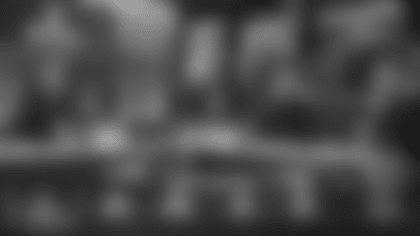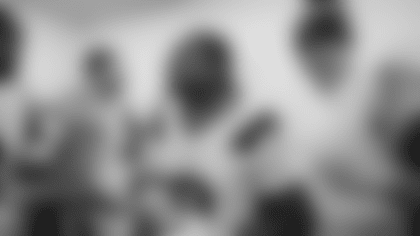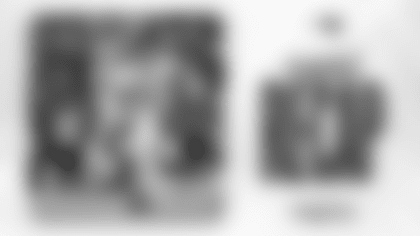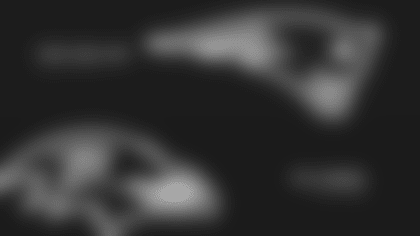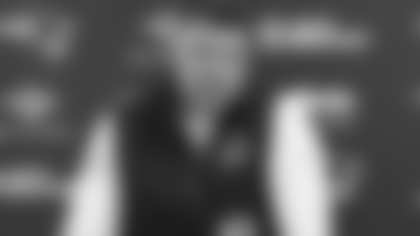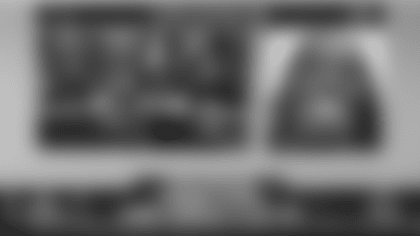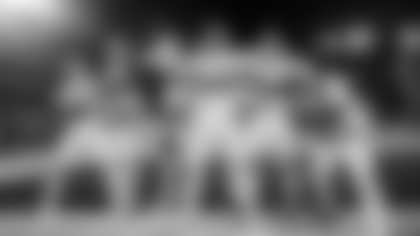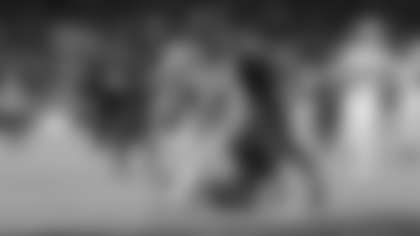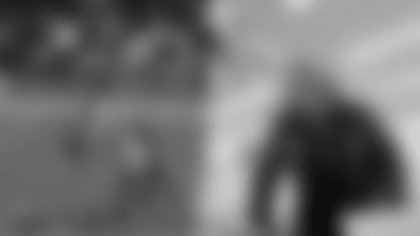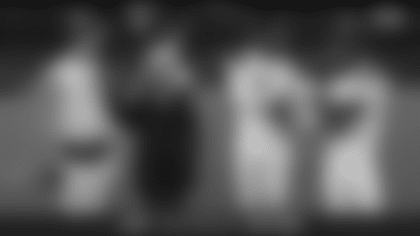[

]()
BB: I think everybody has the injury report. It's a little bit longer than usual this week unfortunately. I think most of those guys probably have a real good chance of coming down to the wire, a game-time type of decision or a weekend decision. We'll just have to see how it goes. I think they've all got a shot but we've got a ways to go too. But overall that list of guys, it's a pretty tough group. They've been in the training room they've been getting a lot of treatment and I think they're doing all they can to get ready. So hopefully as many as possible can come around. As far as the Chargers go, this is a real impressive football team. They do an awful lot of things well. They're good in the kicking game. They're very good on defense, of course they lead the league in defense. They're tough against the run. They're tough against the pass. They're good on third down. They're good in the red area. Offensively, this is a team that runs the ball, they're good in the red area. They don't have many turnovers. They're a very efficient team, they've got some big play guys at all positions – backs, the tight ends, the receiver, the quarterback. I think this will be a real big challenge for us this week going out there on the road to take on an undefeated team that does a lot of things well. They're well coached. They have good system. They have good players and they're playing well. This will be a real big test for us out there in San Diego this week.
Q: How much different are they with Marty (Schottenheimer) there?
BB: Well, offensively there is some carryover from what they did last year offensively when Norv (Turner) was the offensive coordinator. Cam (Cameron) has a similar type of philosophy. Defensively, a lot of familiar faces, the schemes change a little bit but the personnel is very similar to what it was last year with a few adjustments.
Q: Looking at last year, will that help?
BB: The quarterback was different. Doug (Flutie) has a little different style of play than Drew (Brees) does. I mean they're both good players but their styles contrast a little bit. There's certainly come carryover, there's some similarities. But I think there are a number of differences in the team. The team is playing with a lot of confidence and a lot of purpose and they're playing very well right now. All those things are impressive.
Q: Would you almost rather face a quarterback that you are familiar with rather than a quarterback like Drew who you haven't really gone against?
BB: Well you have to get familiar with them. That's true of all players and the quarterback is an important player, but so is everybody else. So is the right tackle and the split end and the running back and so forth. You need to get to know each player's strengths and weaknesses and how you want to attack them or defend them as the case might be. That's important with every player in every phase of the game, offense, defense, special teams. So many parts of the game are one-on-one match-ups and not only who you match-up against them but also the techniques that you use to encounter that player and the techniques that he's using. There's a lot of games within a game there. It's a critical part of every game, is the personnel match-ups and knowing the strengths and weaknesses of our opponents.
Q: You played them early last year as well, what happened to them last year? Why did they struggle after they played you?
BB: Well, I really didn't see them much after we played. We didn't get another shot at them and this year with the new coach and the changes they've made, we really concentrated on their seven games this year. The four preseason games and the three regular season games. We didn't really do a real extensive study on them at the end of the season last year because if we did there would be a lot of schematic changes and however they would fit the new personnel in we would kind of have to wait and see how that would turn out. Guys like (Quentin) Jammer, of course we just saw him last week and (Reche) Caldwell and guys like that we've just have had to wait to see where they would be placed in their schemes.
Q: What impresses you about Brees?
BB: He seems like a real good decision maker. He's an accurate passer and a good decision maker. He doesn't have any bad plays. His completion percentage is good. Makes good decisions in the red area. He makes good decisions under pressure and that's really what it's all about for a quarterback is making good decisions and getting your team the victory. Stats are, they're great, but in the end, it's making the right decision at the right time to get your team whatever it needs to win. Whether that's running out the clock or whether it's a third down conversion and using the cadence to get somebody to jump offside or a play action fake to get a guy a open whatever it happens to be. I think he's a mature guy that's, even though he's only won a few games under his belt and one year of experience, he's pretty astute and pretty efficient.
Q: What did you think about him coming out of Purdue?
BB: I thought he was pretty good. He threw the ball a lot, he's a tough guy. Again, managed the team well, handled two-minute situations, pressure situations in the Big Ten on the road and brought his team back. It's obvious that his players and his teammates have a lot of confidence in him. I was talking to Matt (Light) about that, that is definitely true, he was a well-respected player on that team and a real leader. I thought he was pretty good.
Q: Can you compare (LaDainian) Tomlinson to someone either you have faced this year or someone that you've seen in the past?
BB: I can't think of anybody right off the top of my head. But he's…Tomlinson's got a lot of things going for him. One is he is an instinctive runner. He sees the holes well and he can find the daylight and reads blocking schemes very well. He runs hard, he's got speed and you know he can catch the ball. He's not a guy that just does one thing real well. I think he's got a variety of skills and can threaten you in a lot of different ways. He can make you miss. He can get his shoulder down and run with some power, catch a ball out of the backfield and he's got good vision. If you overrun the plays, he'll see those lanes and cut it back. He's not a real big guy like a (Jerome) Bettis but he's bigger than a Curtis Martin size-wise he's in that good size but not a real big back, but sometimes can play like a big back. And has the elusiveness of, not a scat-back not a guy like (London) Fletcher who is their third-down back. But he can make people miss and he's a good daylight runner.
Q: Was there any doubt that maybe he might slip to you in the draft?
BB: I think we thought that was the move (John) Butler was going to make when he traded down that they had just acquired Flutie and they were really looking for running backs so we weren't going to move out of that spot – trade up or down. We weren't really looking to move out of that unless all of our players were gone. We had three players that we were looking for, then we would have considered moving down but we really weren't expecting the high probability that we would move in that draft and kind of thought Tomlinson would go there.
Q: San Diego lost their starting center to an Achilles tendon injury. Does that provide a unique point of attack for their offense? How disruptive is it to lose your center?
BB: Well I think that's probably…you know Cory Raymer is a good player. Marty brought him with him from Washington. I think he does a real solid job in there. (Jason) Ball is a guy that I thought had a good college career, played well in the all-star games. He's a strong guy that's a real scrappy player, does a good job of finishing blocks. I thought he played well last week when he stepped in there. He's been out there all year, I'm sure they have confidence in him to put him in that situation. There wasn't any really kind of noticeable drop-off in their performance when he got in there. I think the offensive line is one of those positions where it's how the whole unit functions and particularly at the center and guard spot, there are a lot of different combinations offensively that you can create. Those individual match-ups, they occur, but it's hard to know when you're going to get them because of the different blocking schemes that an offense can employ. I think that Cam and Marty do a good job of gap-blocking and angle-blocking in the running game so that they double-team, they cut off the defense and try to create little cracks in there for the runner. It's really more about how you execute that scheme than a lot of one-on-one zone, just man-on-man blocking like some teams do.
Q: How do the number of injuries affect your preparation for this week?
BB: Well the guys that can't practice, the other people are going to have to take reps for them. We'll just have to see how those guys come along, whether they can do anything tomorrow or do anything on Friday. We're going to have to make some decisions here probably after practice today and then after practice on Thursday as to how likely we think it will be for certain guys to play and how that affects, you know we have a lot of different packages both on offense on defense, different personnel combinations and that may affect how much we want to use or even prepare to use certain of those groups.
Q: If a player is, say, 30 percent. Would you leave him behind on such a long flight with swelling and all?
BB: Right. If we don't think that the player would be able to play, then to put a guy flying back and forth cross-country in three days, I doubt that would really be a good remedy for any player's condition. Most likely what we would do is leave that player behind and let him get the extra time in treatment and rehabilitation. If we thought that there was an opportunity for the player to play then we probably would take them and go down to the wire with it and see how it turned out over the weekend. If he definitely wasn't going to play then yeah I don't think it would be much percentage in making him make that trip.
Q: Do you expect any of these guys to practice today?
BB: Well, we'll just have to see. Really the way it goes in practice is we go out there and we loosen up. We go through some individual drills, sometimes the guys get out there and get running and get going and feel ok. Then they do a little bit more and sometimes as they start to do little bit more then whatever the injury is starts to bother them a little bit and then they shut it down. We go through the same process with all those guys. They start at practice where the tempo is low and then it increases a little bit. Then as it increases then a combination of the player, the trainers, the doctors and the strength coach make the decision as to whether we're going to spend more time with the conditioning and the coaches will say whether they can take some reps and moderate them or not take any at all. We haven't done anything since Sunday, so we'll have to go out there today and see how there doing. I'm sure some guys will do more than others, I'm not sure that I can tell you which guy would do the most. We'll just have to see how they feel.
Q: San Diego has the number one ranked offense in the league. How much of that is the offense that they have faced and how much of that is the amount of talent on that side of the ball?
BB: San Diego is a good defensive team. They've been a good on defense for a number of years, they really have. They have a good front four, their linebackers are active, Donnie Edwards has been a real good addition to that group. He gives them speed, a lot of big play ability and experience there in the middle. (Ben) Leber has given then a little bit of a boost too. He's made some plays coming off the edge rushing the passer. That kid has got good speed. I think that eventually Jammer played a little bit last week, it was his first game, but certainly he'll give them a little more talent there in the secondary. This has been a good defensive start with, they've got real good ends, good inside people, good linebacker group of course headed by (Junior) Seau and add Edwards to it. They've been strong and they're playing well now. They're getting…they're turning the ball over, people aren't converting third downs against them and they're not giving up touchdowns in the red zone. Any team that can produce that formula is going to play well on defense, they're going to win a bunch of games.
Q: Is Seau absolutely the heart and soul of that defense?
BB: I think Junior really is. He's a very emotional player and he's a tough player. Junior is never out of a play. There are plenty of plays where at the beginning of a play he's blocked or it looks like he's not going to be a big factor then as the play goes on he gets in on a lot of them. Whether it's making tackles or tipping balls or disrupting blockers so that somebody else can come free. He's an emotional guy. He's a strong physical player and he's really a player that can turn a game around in one or two big hits causing a turnover making big plays. I think a lot of it starts with Junior. They have a lot of other good players to go with him but you know he's an emotional guy, I think he's a real…yeah, I would say that he is the heart of that defense.
Q: Keeping in mind that it's only been three games, is it unusual for an offense to undergo this much turnover at the skilled positions and have this kind of production?
BB: I don't know if there's any real formula for that. I think that in the passing game the fact that those players for the most part been out there all the time. They haven't missed a lot of time. I'm not saying they haven't missed any practices but they've been there really since the beginning of training camp. I'm talking about (Donald) Hayes and (Deion) Branch (Christian) Fauria, (Daniel) Graham, you know (Cameron) Cleeland missed a little time, I mean they each missed about a week or so but for the most part they've been out there. They have been working hard. The quarterbacks have been working with them, all three quarterbacks have taken all the snaps that they can take. I think that the timing and the execution has a chance to get better when you can keep everybody out there working on a daily basis. You make a mistake, you come in and correct it and go back out the next day and try to improve on it. That's how you do it is by being out there and being able to practice it and do it. I think that's had something to do with it, the players have worked hard and they've worked hard to pick up the new system. Whether it's been Cam or Christian or Deion, Donald, Graham all of them, they've had to learn some things differently from what they've done in previous years along with the quarterbacks they've worked hard at it and some things have shown up positively in the games.
Q: You had a dozen penalties last week in the game. Is there a tangible was to work on that and concentrate on that in practice?
BB: Well, I think it's concentration and judgment. There are certainly things in practice that we could do to eliminate some of those. Things like a lineman on the line of scrimmage lining up offside, being down field on a punt, being offside on the kickoff. Those are things that we can watch for in practice and correct and we do that anyway, it's not like that would be anything revolutionary for us. Some of the other things that come up in the game you know late hits, personal fouls and that type of thing, those are judgment plays and believe me they've been discussed. There have been examples shown of what we are looking for and what we aren't looking for so that I think that everybody understands that in the end it comes down to player's making a split second judgment as to whether the block is or isn't from behind or whether it is or isn't before the whistle. There's a lot of things that are borderline, but we have to make the decisions that stay within the confinements of the rule. We talk about them. We show it to them on tape. Some things we practice, other things are just going to have to be more from game experience. But I think it's a combination of all of them. But in any case there were way too many of those. It was core and it hurt us, it kept us from having any kind of production, it hurt our field position and it won't be good if we keep doing that.
Q: There has been a lot of talk about you guys throwing the ball a lot. It seems like a number of them have been under five yards. Do you guys look at those essentially as running plays?
BB: I think you can look at it that way. They're not runs, they're not hand-offs but they're controlled passes, they're not 50 yards down the field. They probably would gain yardage similar to a running play so I think that's a fair characterization. I mean we don't say 'well we threw it, we ran it', we didn't. But we understand that there are different types of passes, let's put it that way. There are deep passes, there are intermediate passes and then there are shorter ball possession type passes that I think in some respects are equivalent to the type of yardage or the type of gain you would be looking for in a running play.
Q: Is there a bigger upside to one of those?
BB: Well, no. I think that there's no question that there's potential for an upside anytime a player can gain yardage on his own after the first hit whether that's a running back, whether it's a receiver whoever it is. It also comes with the accuracy of the passing. For a player to run after the catch, he needs to have the ball put in a position where he can catch it cleanly and get his shoulders turned up field and run with it. A lot of times you see guys having to turn around and catch the ball behind them or having to reach up and jump for it or take it down by the ankles. Most of the time on plays like that, it's not too long before they either fall down or somebody tackles them just because they can't get in a good running position. If a player can get the ball and get his shoulders turned up field in a hurry and he's got some run skills then that's a chance for some extra yardage. There's no question that's a big part of a short passing game is to be able to convert that yardage into yards after the catch. I know in the West Coast offense, when Bill Walsh ran it out in San Francisco, and talking to Bill one of the things he was proudest of about that offense was that when they were going well over half their yards in the passing game came after the catch. That's a lot of yards. It's not just how far you throw it, but what the player can do after he catches it and again a big part of that is the player's running skill, number one, but also the accuracy of the pass which when you talk about a guy like Joe Montana, it seemed like those guys never had break stride for the ball. They would just right the way they were going and just continue to gain ground. Those are the elements that factor into that.
Q: This is a pretty difficult doubleheader if you will with San Diego and Miami coming up. It seems a little bit of a daunting challenge with flying to the West Coast.
BB: This is a big challenge this week. San Diego is a good football team. They're playing well. We've got to go on the road, as you mentioned, go out to the West Coast to play them. We're playing them in front of an enthusiastic crowd and a team that has a lot of emotion that's playing well. But that's the challenge for us. We're not going to do anything but try to meet it head on. That's all we can do. But it will be a tough one. This is a good football team and they've got a lot of things going for them.
Q: Any danger of your guys thinking because it's Miami and these are the Chargers…
BB: Well right now we don't care anything about Miami. All we care about is the Chargers. We don't care anything about Kansas City.
Q: I know you don't, but I'm talking about the team.
BB: Well I'm speaking for the team. We're worried about San Diego. I don't know how you can look past San Diego, they're the best defense in the league. They've won three in a row, they run the ball well on offense, and they're good in the kicking game. I mean all you have to do is put on the film and you can see whatever you want to see. Defensively, I thought they did a real good job against San Francisco in the last preseason game, they played St. Louis in that third preseason game where you know everybody talks about that's really the big hump game, but St. Louis couldn't score on them in the red area either. I think that this is a team that it's not one game, we've seen all seven of them. They've been consistent all year, offensively, defensively and in the kicking game, they've played good solid consistent football. They don't make many mistakes, they don't have a lot of penalties, they don't have a lot of turnovers, they don't have a lot of negative plays. They just go out there and play well and if you're sloppy they will really make you pay for it with turnovers and negative plays and sacks and strip sacks and all that kind of stuff. They will make big plays on offense. (Curtis) Conway will make them, Tomlinson will make them, (Stephen) Alexander will make them. If you don't take care of business they've got all the guys that can hurt you.
Q: What is it about Schottenheimer that has allowed them to be consistent?
BB: I think Marty is a very well-prepared coach. He's thorough. His teams are sound. Again they don't make many mistakes. They very seldom put themselves at a real disadvantage. They go there and play good solid, sound football. Marty was a tough player and I think his teams carry that element of toughness. From him as a coach, I think his teams are physically and mentally tough, they're resilient and that's just the way Marty is personally. He's well prepared he's thorough, he's smart, he's sound. He's been that way for a long time and I think his team's reflect that. He's got a good coaching staff. Bill Arnsparger, nobody knows more about defense than Bill Arnsparger. That guy, he wrote the book on everything. Nobody has done it before he did. Offensively they've retained that Norv Turner/Cam Cameron type system there. So even though some of it is new, there's a lot of carryover there. They have a lot of experience, he has a real experienced coaching staff. I am sure they are as well-prepared as he is.
Q: Are there certain quarterbacks that are more effective in running the no huddle?
BB: Well I think that the big thing any time you run a no huddle or a two-minute situation, the quarterback just has a little more control over the game. I mean, he has to make some decisions that in a huddled situation are pre-called and sometimes that's good and sometimes that bad. But he just has a little bit more control over the game so there's more time to recognize the defense, more time to identify it. Sometimes he has the ability to switch plays quicker or more easily than he would in an audible situation in a normal huddled situation. There's a little bit more on his shoulders in those situations or at that point.
Q: Even if it's not a two-minute situation?
BB: Even if it's not a two-minute situation, you're still, you're at the line quicker, things are going to declare quicker. So you have the ability to either see them quicker or change them. I mean like when Jim Kelly was running the no huddle up at Buffalo, they ran it the whole game, but they ran it at an up tempo and it just forces you defensively to get up there do what you're going to do because they're going to snap the ball. So it gives the quarterback a little bit more time to see it and process it and whatever the plan is, whether it's a change of play or where he's going to throw the ball or whatever it is he just has a little more time to do it.
Q: Does that limit the number of personnel changes?
BB: It can if you run it at a tempo where … the biggest problem defensively when you're trying to work against a no huddle, it isn't always getting a player onto the field. You can run one on and get one off, the problem is sometimes getting that player onto the field and also knowing where to line up and what to do and what his assignment is on that play and to sort out where the offense, you know where everybody is deployed in a short amount of time. Normally when you see a defensive team, you have one guy calling the signals, the other 10 guys are facing the offensive formation, they see them break the huddle, they see the deployment and they can start the process their assignments. But when you're running on and off the field and everybody is already out there, then that just accelerates how quickly you … all that communication and all that has to take place. From that respect it limits you a little bit. You have to be careful about running a lot of guys on and off, particularly guys that are involved in the coverage. Now what you do see sometimes is a lineman, one-for-one, a defensive end for a defensive end, and try to get a fresher pass rush guy on the field and that type of thing but that assignments, it's usually more limiting.
Q: Was it an easy decision to fly out on Friday to San Diego?
BB: What did you want us to do, take the train out? Well it's a Sunday game. It's a Sunday, 1:00 game, so we thought that flying out on Saturday might be cutting it a little tight. When we play Oakland later in the year, Sunday night, we will fly out on Saturday morning. But there is quite a bit of a time difference between the game time Sunday, Sunday in San Diego, and the Sunday night game in Oakland. Yeah, we talked about it both ways. We felt like this is, right now, the easiest thing logistically for us. But in the end if we get there on time we should be ready to play.







